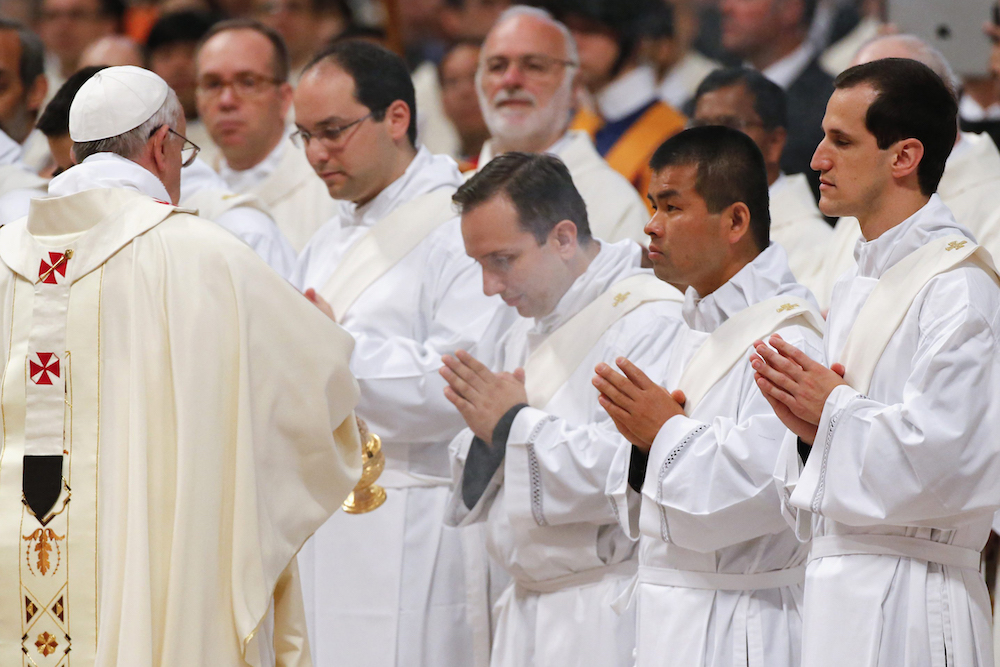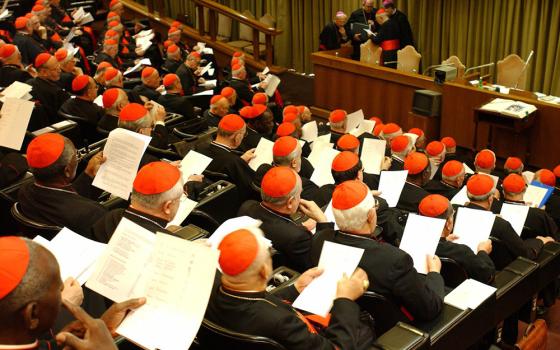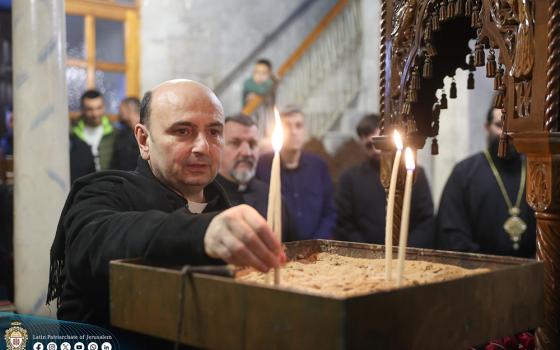
Pope Francis uses incense to bless new priests before their ordination Mass in St. Peter's Basilica at the Vatican May 11, 2014. In a letter addressed to priests around the world Aug. 4, 2019, Francis acknowledged the shame and frustration felt by priests who are discouraged by the actions of fellow clergy members who betrayed the trust of their flock through sexual abuse and abuse of conscience and power. (CNS/Reuters/Stefano Rellandini)
The Holy Father was true to his name last weekend when he published a fatherly letter to priests on the occasion of the 160th anniversary of the death of St. John Vianney. The letter was remarkable in many ways, a most exemplary text in understanding how Pope Francis brings our tradition alive and uses it to face the challenges and opportunities of our day. I should like to highlight some elements that seem to me to be quintessential Papa Bergoglio.
First, there is his brutal frankness. He begins by addressing the clergy sex abuse and its effects on the presbyterate. "As you know, we are firmly committed to carrying out the reforms needed to encourage from the outset a culture of pastoral care, so that the culture of abuse will have no room to develop, much less continue," he writes. "This task is neither quick nor easy: it demands commitment on the part of all. If in the past, omission may itself have been a kind of response, today we desire conversion, transparency, sincerity and solidarity with victims to become our concrete way of moving forward. This in turn will help make us all the more attentive to every form of human suffering."
The direct acknowledgement of both the scourge and the challenges they face is followed by a deeply spiritual insight: Accompanying the victims of abuse will "make us all the more attentive to every form of human suffering."
Second, there is the deeply traditional understanding of sin and grace at work in the life of the church. "Let us not grow discouraged! The Lord is purifying his Bride and converting all of us to himself. He is letting us be put to the test in order to make us realize that without him we are simply dust," Francis writes, quoting from a talk he gave to the presbyterate of Rome earlier this year. "He is rescuing us from hypocrisy, from the spirituality of appearances. He is breathing forth his Spirit in order to restore the beauty of his Bride, caught in adultery. We can benefit from rereading the sixteenth chapter of Ezekiel. It is the history of the Church, and each of us can say it is our history too. In the end, through your sense of shame, you will continue to act as a shepherd. Our humble repentance, expressed in silent tears before these atrocious sins and the unfathomable grandeur of God's forgiveness, is the beginning of a renewal of our holiness."
How different his words are from the programmatic, managerial understanding of the life of the church we encounter so often in this country, so focused on who has power.
Francis' spirituality is also very traditional and very vibrant: No flashy new lights for him. In the section on praise, he begins by recalling the Magnificat, and how when he visits a Marian shrine "I like to spend time looking at the Blessed Mother and letting her look at me." He continues, "Perhaps at times our gaze can begin to harden, or we can feel that the seductive power of apathy or self-pity is about to take root in our heart. Or our sense of being a living and integral part of God's People begins to weary us, and we feel tempted to a certain elitism. At those times, let us not be afraid to turn to Mary and to take up her song of praise."
Advertisement
Third, there is the practical pastoral wisdom, born of a life of attentiveness to forming priests to be good and faithful shepherds. This passage is so simple and, yet, it gets to the heart of the spiritual challenge and connects it to the profound spiritual and theological reality that is the basis of our faith. He writes:
One good way of testing our hearts as pastors is to ask how we confront suffering. We can often act like the levite or the priest in the parable, stepping aside and ignoring the injured man (cf. Lk 10:31-32). Or we can draw near in the wrong way, viewing situations in the abstract and taking refuge in commonplaces, such as: "That's life…", or "Nothing can be done". In this way, we yield to an uneasy fatalism. Or else we can draw near with a kind of aloofness that brings only isolation and exclusion. "Like the prophet Jonah, we are constantly tempted to flee to a safe haven. It can have many names: individualism, spiritualism, living in a little world…" Far from making us compassionate, this ends up holding us back from confronting our own wounds, the wounds of others and consequently the wounds of Jesus himself.
The connection of the priest's own wounds with those of others and, therefore, the wounds of Christ, is so simply done, yet profoundly, too.
In the chapter on gratitude, the pope finishes each paragraph with a quote from the psalmist that characterizes his teaching: His mercy endures forever. In that section, he bids his priests give thanks for "the holiness of the faithful People of God," harkening back to the evening of his election when he asked the people gathered in St. Peter's Square to pray over him before he imparted the apostolic blessing on them.
Fourth, the pope's understanding of ministry and the priesthood is deeply rooted in the teachings of the Second Vatican Council. Pope Francis' way is not the way of the "heroic priesthood." You will find no Jungian archetypes here. He writes, "We know that it is not easy to stand before the Lord and let his gaze examine our lives, heal our wounded hearts and cleanse our feet of the worldliness accumulated along the way, which now keeps us from moving forward. In prayer, we experience the blessed 'insecurity' which reminds us that we are disciples in need of the Lord's help, and which frees us from the promethean tendency of 'those who ultimately trust only in their own powers and feel superior to others because they observe certain rules.'" This anti-Pelagian approach to discipleship is so needed in our day when we are tempted to rely on ourselves and our mastery of new technologies or new ideologies and forget our reliance on the Lord.
And so far from encouraging any vision of the priesthood that emphasizes the distinction between the lay faith and the ordained ministry, he reminds the priests to be encouraged by the fact that "our people have a 'nose' for things. They sniff out, discover, new paths to take; they have the sensus fidei (cf. Lumen Gentium, 12)… What could be more beautiful than this?" Again, it is not just his fidelity to Vatican II, it is how he makes the teachings of that council fresh.
This short text will go down as one of the paradigmatic documents of this pontificate. It breathes faith, hope and charity. It displays a wisdom of years and a still youthful heart. Deeply rooted in the tradition, it does not treat the tradition as a source of proof texts and footnotes but as a springboard from which to vault into the challenges of our day. It is one of Francis' finest, simplest, most profound texts, and I hope the priests of our time can and will receive it as such.
[Michael Sean Winters covers the nexus of religion and politics for NCR.]
Editor's note: Don't miss out on Michael Sean Winters' latest. Sign up and we'll let you know when he publishes new Distinctly Catholic columns.







